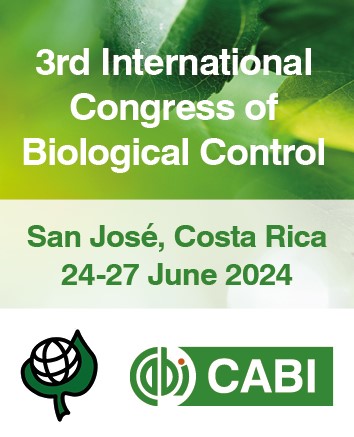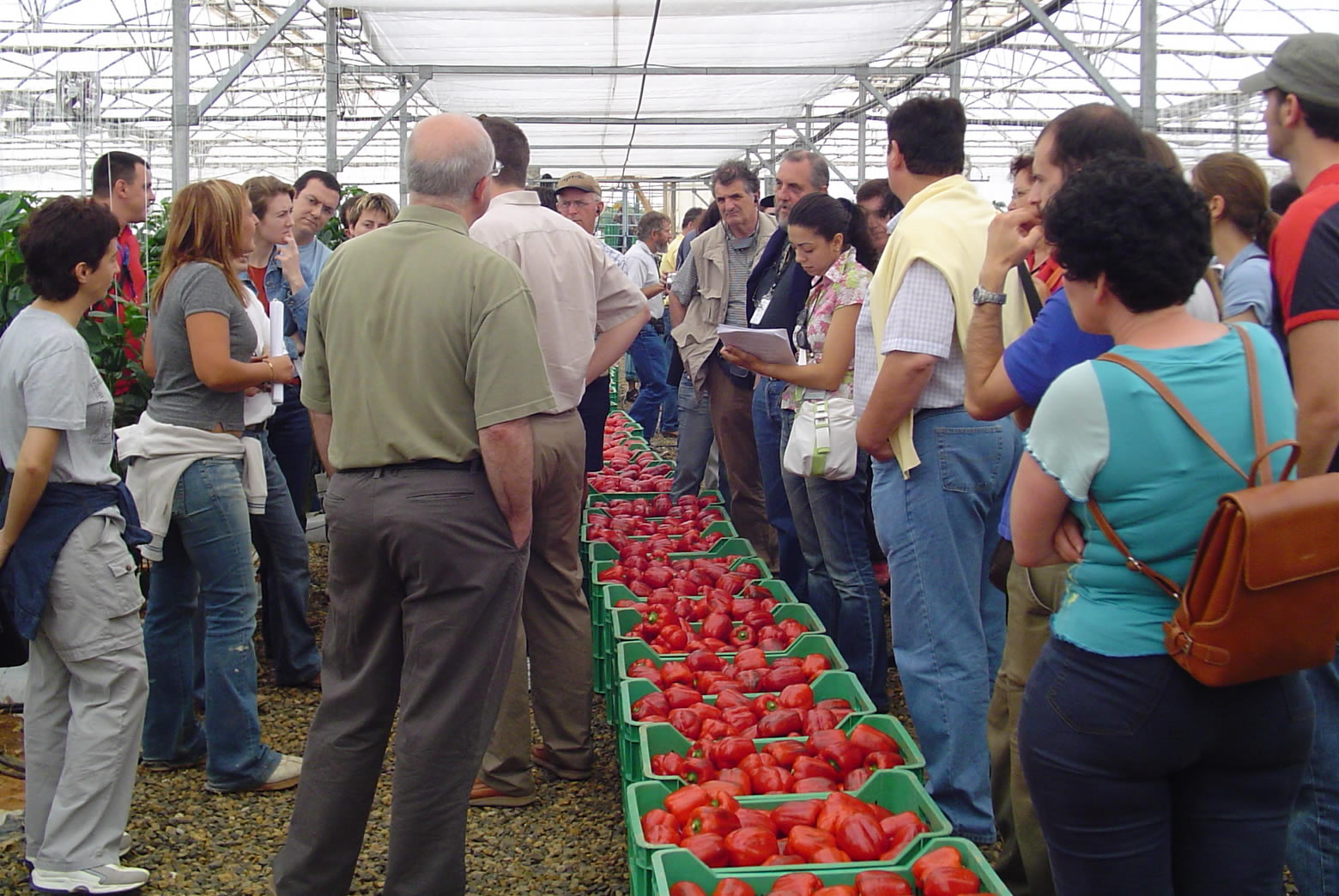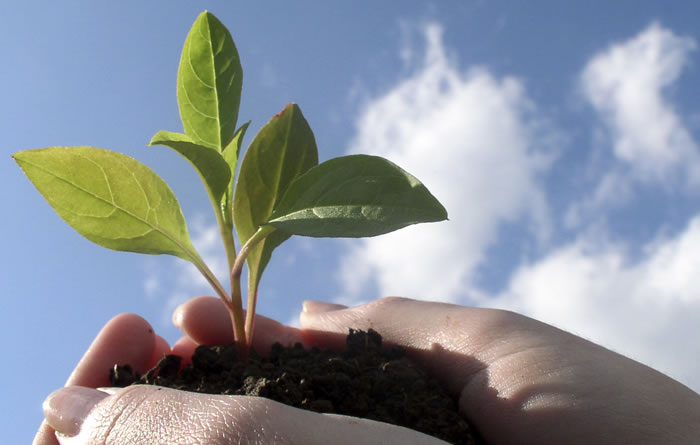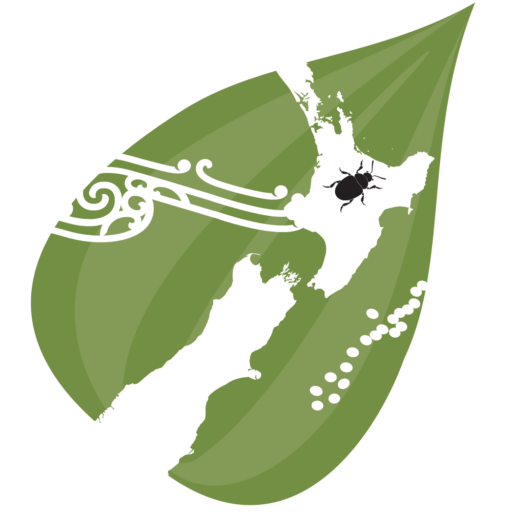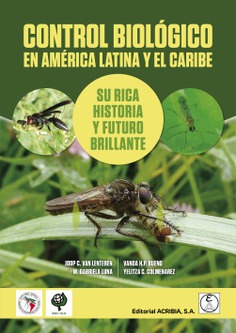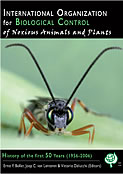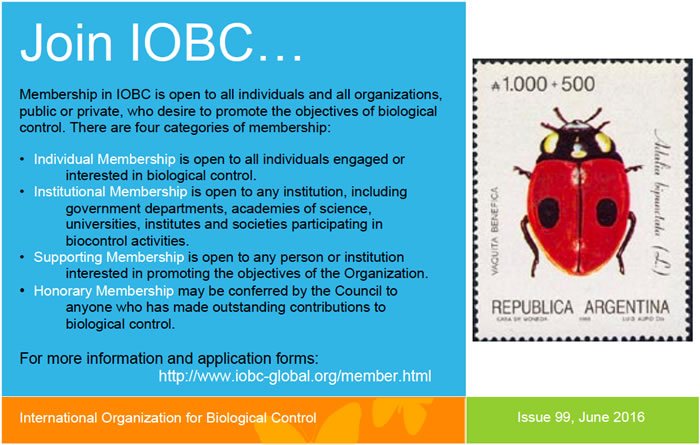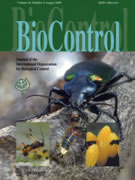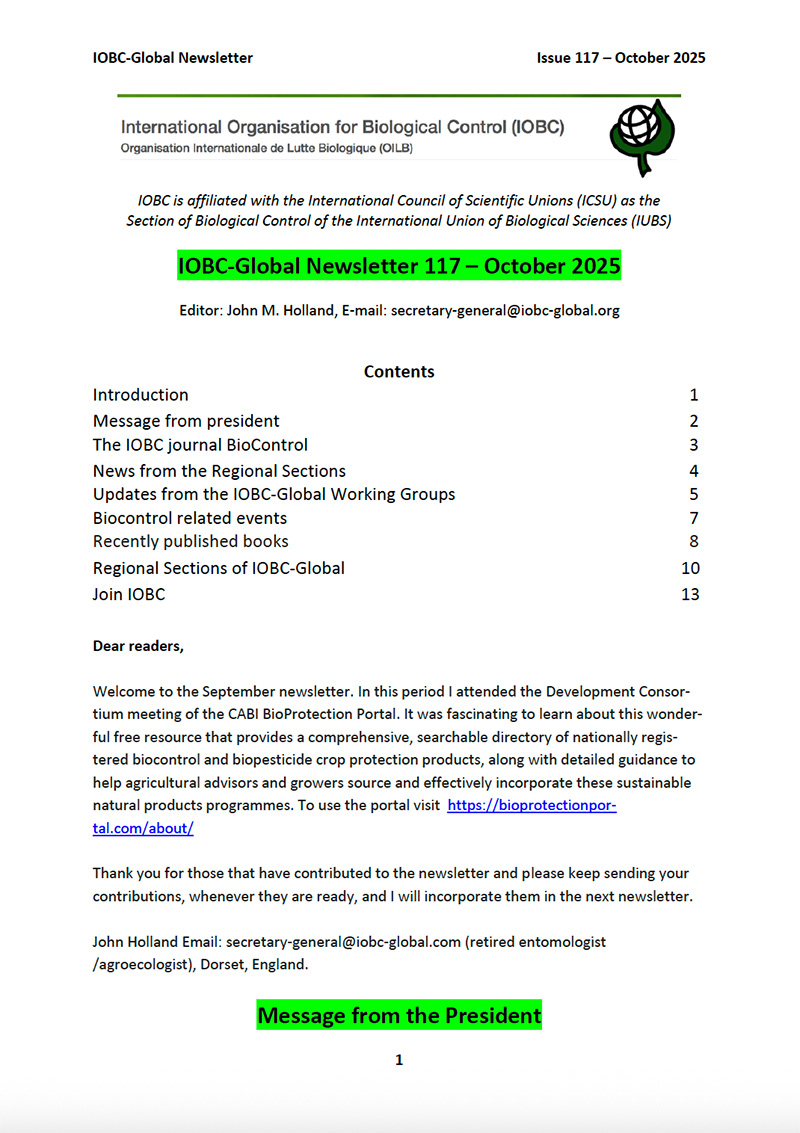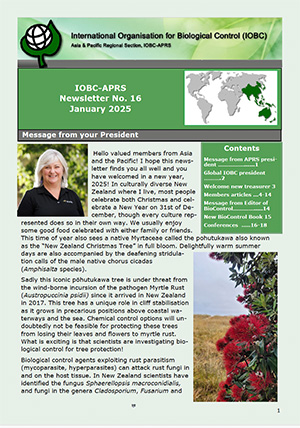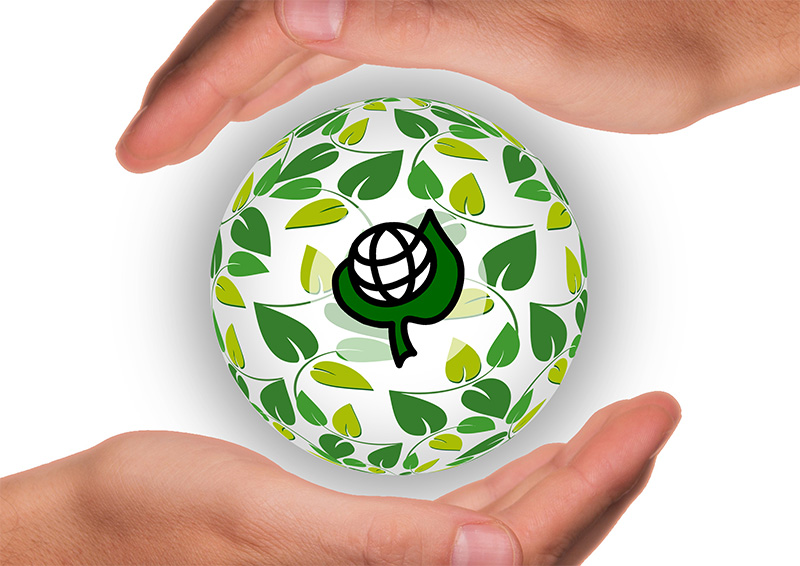
International Organisation for Biological Control (IOBC)
Organisation Internationale de Lutte Biologique (OILB)
The International Organisation for Biological Control (IOBC) promotes environmentally safe methods of pest and disease control. It is a voluntary organisation of biological-control workers.
Membership in IOBC gives individuals and organisations the opportunity to participate in biological control activities beyond their specific jobs and workplaces, to step outside their bureaucracies, and to contribute to the promotion of biological control worldwide.
IOBC Regional Sections, Working/Study Groups and Commission
APRS |
Asia
and the Pacific Regional Section |
|
ATRS |
African
Tropical Regional Section |
|
EPRS |
East
Palearctic Regional Section |
|
NRS |
Nearctic
Regional Section |
|
NTRS |
Neotropical
Regional Section |
|
WPRS |
West
Palearctic Regional Section |
- Mass Rearing and Quality Assurance
- Aphidophaga
- BC and Mgmt. of Eupatorieae Weeds
- IWGO - Ostrinia and other maize pests
- BC and Management of Parthenium Weed
- BC of Diamondback Moth
- GCWG - Management of Cactus Species
- CWBC - Classical Weed Biological Control
- More working groups within Regional Sections
Commission
Latest News and Events
Interview
"Have a passion and follow it through with conviction!"
This interview introduces the IOBC-Global President elected for the period 2025-2028, Raghu Sathyamurthy. It outlines his career, lets the audience know what opportunities he sees for IOBC, where he would like to focus during his term and much more. Last but not least, Raghu talks about what defines him as a private person, what his favourite hobby is and what he would like to pass on to the next generation of biocontrol scientists and practitioners.
ICBC3, Report
The congress attracted 320 delegates of 40 countries to an excellent venue, where the science was of a high standard and the debate robust. There were six excellent plenary papers covering the entire value chain of biological control that really set the scene for the congress, where 162 papers and 52 posters were presented.
How to become a Biocontrol Practitioner?
How did you become a biological control practitioner?
There is no straightforward answers to this questions as there are many roads to obtain a position in biological control.
Check out the shared career paths to become a biological control practitioner!
Share your own career path, a few sentences (and an optional picture) will suffice: secretary-general@iobc-global.org
Biocontrol Training
Worldwide Education in Biological Control
IOBC Global often receives questions about education and training possibilities for biological control. Please provide information about YOUR education and training opportunities. We will publish it on the Global website. Send the information to secretary-general@iobc-global.org:
- Name of course / training
- Institute / organization providing this course
- Course period and length of course in days
- Costs of course
- Entrance requirements
Financial Support for Biocontrol Training
Financial Support for Biocontrol Training
IOBC-Global may financially support participation of young career biological control scientists (< 35 years) who are paying member of one of the Regional Sections of IOBC, so they can take part in a training course. Guidelines and conditions for funding: Information about proposals for IOBC support of a training course (pdf).
Writing Partnership
Non-native English speakers sometimes need help in preparing scientific articles for publication in English language journals.
IOBC Global is establishing a pool of volunteers to help review and edit these articles, especially for young scientists. The editing is not focused on scientific content, but rather on language use and clarity. Please contact the Secretary General if you are willing to volunteer.
Biostimulants Europe
Biostimulants Europe 2026
4th - 5th February 2026,
Valencia, Spain.
ACI’s Biostimulants Europe 2026 conference will bring together industry leaders, researchers, scientists, and professionals from the biostimulants sector. The conference serves as a platform for knowledge exchange, networking, and discussions on the latest advancements, challenges, and opportunities in the field of biostimulants.
ISBCW 2026
XVII International Symposium on Biological Control of Weeds,
8-13 March 2026,
Rotorua, Aotearoa New Zealand.
The International Symposium on Biological Control of Weeds (ISBCW) is the most important event for weed biocontrol scientists from all over the world.
ICE 2028
XXVIII International Congress of Entomology in 2028 (ICE 2028),
17-21 July 2028,
Cape Town, South Africa.
The theme of ICE 2028 is: “Entomology for a better future”. This international congress offers an opportunity for Africa and the rest of the Global South to join in the journey to this better future, while still offering a world class conference venue and city for international delegates.
Book Announcement
Control Biológico en América Latina y el Caribe: Su rica historia y futuro brillante (Spanish version of Biological Control in Latin America and the Caribbean)
IOBC History Book
IOBC: History of the First 50 Years (1956-2006).
Edited by: Boller, E.F., J.C. van Lenteren and V. Delucchi, 287 pp.
The book is available as free PDF.
Follow @IOBC_Global
It's a clearinghouse for interesting information on biological control - feel free to follow it and post to it!
IOBC-Global Newsletter
Newsletter 117, Oct. 2025
Get the latest information about IOBC and enjoy reading!
Newsletter 117 (pdf)
Newsletter contributions, ideas, comments: Contact secretary-general@iobc-global.org
New Publication: Augmentative Biocontrol in Latin America and the Caribbean
Joop C. van Lenteren, Vanda H.P. Bueno, Wagner Bettiol,
Latin America has the largest area under augmentative biological control worldwide, mainly with applications in open field crops
Biological Control, Vol. 207, 2025
Open access: Download
Status as Non-profit Organization
After a few years of hard work, writing and revising documents, and negotiations with lawyers IOBC-Global is since the end of July 2024 officially registered as a non-profit, non-governmental organization in Switzerland.
Advertise or Find Job Opportunities
The IOBC-WPRS Regional Section offers the opportunity of drawing attention to biological control related job opportunities, internships, post-docs, studentships etc.: https://iobc-wprs.org/job-opportunities

